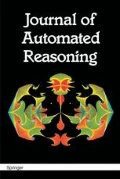Abstract
This paper investigates a consistent versioncwa s of Reiter's closed-world assumptioncwa. It provides a syntactic characterization of minimal entailment ⊢ min : for every ∨-sentence ϕ and for every ∨-theory Σ,
A version of this characterization remains valid if not all relations are subject to minimization. These two characterizations do not use the domain-closure axiom nor the unique-names assumptionuna, although they may be easily modified to ones that incorporateuna. A similar result for Herbrand entailment ⊢ Her , by means of generalized domain-closure axiomdca s , is provided: for every ∨-sentence ϕ and every ∨-theory Σ,
Finally, a syntactic characterization of domain-minimal entailment ⊢ dom in terms of a versionmda s of minimal-domain assumption is shown: for every ∨-sentence ϕ and for every ∨-theory Σ,
The proving power of these entailments is then evaluated. In particular, it is shown that (1) neither ⊢ min nor its versions are strong enough to derive positive sentences from Σ unless they are first-order provable from Σ however, a double application of ⊢ min has enough power to derive such positive sentences; (2) ⊢ Her has the strength of infinitary rule of inference but cannot derive existential nor quantifier-free sentences from Σ unless they are first-order provable from Σ (3) ⊢ Her and ⊢ dom can derive from Σ certain positive facts about = which are otherwise unprovable from Σ and (4) ⊢ dom cannot derive from Σ sentences without positive occurrences of = unless they are first-order provable from Σ. Moreover, the paper relatescwa s to Reiter'scwa and to Minker's generalized closed-world assumptionGCWA and its extension.
Similar content being viewed by others
References
Barwise, Jon (Ed.),Handbook of Mathematical Logic. North-Holland, Amsterdam, second edition, 1978.
Barwise, Jon, ‘An introduction to first-order logic’, In [1], Ch. A.1, pp. 5–46, 1978.
Bossu, Genviève and Siegel, Pierre, ‘Saturation, nonmonotonic reasoning, and the closed-world assumption’,Artificial Intelligence 25(1), 13–64 (1984).
Clark, Keith L., ‘Negation as failure’, in Hervé Gallaire and Jack Minker (Eds.),Logic and Data Bases pp. 55–76, Plenum Press, 1978.
Davis, Martin, ‘The mathematics of non-monotonic reasoning’,Artifical Intelligence 13(1–2), 73–80 (1980).
Etherington, David W. and Mercer, Robert E., ‘Domain circumscription: A reevaluation’,Computational Intelligence 3(2), 94–99 (1987).
Etherington, David W., Mercer, Robert E. and Reiter, Raymond, ‘On the adequacy of predicate circumscription for closed-world reasoning’,Computational Intelligence 1(1), 11–15 (1985).
Hintikka, Jaakko, ‘Model minimization — an alternative to circumscription’,Journal of Automated Reasoning 4, 1–13 (1988).
Jech, Thomas J., ‘About the axiom of choice’, in [1], Ch. B.2, pp. 345–370, 1978.
Keisler, H. Jerome, ‘Fundamentals of model theory’, in [1], Ch. A.2, pp. 47–104, 1978.
Lifschitz, Vladimir, ‘Computing circumscription’, inProceedings IJCAI-85, pp. 121–127, Los Angeles, 1985.
Lyndon, Roger C., ‘Review of paper by A. Horn’,Journal of Symbolic Logic 16, 216 (1951).
Lyndon, Roger C., ‘Properties preserved under homomorphism’,Pacific J. Math. 9, 143–154 (1959).
Marczewski, Edward, ‘Sur les congruences et les proprietés positives d'algèbres abstraites’,Colloquium Mathematicum 2, 220 (1951).
McCarthy, John, ‘Circumscription — a form of non-monotonic reasoning’,Artificial Intelligence 13(1–2), 27–39 (1980).
Minker, Jack, ‘On indefinite databases and closed-world assumption’, inProceedings of 6th Conference on Automated Deduction, LNCS 138, pp. 292–308, Springer-Verlag, Berlin, New York, 1982.
Reiter, Raymond, ‘On closed world data bases’, in Hervé Gallaire and Jack Minker (Eds),Logic and Data Bases, pp. 55–76, Plenum Press, 1978.
Shepherdson, John C., ‘Negation in logic programming’, in Jack Minker (Ed.),Foundations of Deductive Databases and Logic Programming, pp. 19–88. Morgan Kaufmann Publ., Inc., Los Altos, 1988.
Shoham, Yoav, ‘A semantical approach to non-monotonic logics’, inProceedings of the Tenth International Joint Conference on Artificial Intelligence, pp. 388–392, 1987.
Suchenek, Marek A. and Sunderraman, Rajshekhar, ‘Minimal models for closed world data bases with views’, in Zbigniew W. Ras (Ed.),Methodologies for Intelligence Systems 5, pp. 182–193, North-Holland, New York, 1990.
Suchenek, Marek A. and Sunderraman, Rajshekhar, ‘On negative information in deductive data bases’,Journal of Database Administration 1, 28–41 (1990), invited paper.
Suchenek, Marek A., ‘Forcing versus closed world assumption’, in Zbigniew W. Raś and Maria Zemankova (Eds.),Methodologies for Intelligent Systems, pp. 453–460. North-Holland, 1987.
Suchenek, Marek A., ‘Incremental models of updating data bases’, in C. H. Bergman, R. D. Maddux and D. L. Pigozzi (Eds.)Algebraic Logic and Universal Algebra in Computer Science, Lecture Notes in Computer Science 425, pp. 243–271, Ames, June 1–4 1988. Springer-Verlag.
Suchenek, Marek A., ‘A syntactic characterization of minimal entailment’, in Ewing L. Lusk and Ross A. Overbeek (Eds.),Logic Programming, North American Conference 1989, pp. 81–91, Cambridge, MA, October 16–20 1989. MIT Press.
Suchenek, Marek A., ‘Two applications of model-theoretic forcing to Lipski's data bases with incomplete information’,Fundamenta Informaticae 12, 269–288 (1989).
Suchenek, Marek A., ‘Applications of Lyndon homomorphism theorems to the theory of minimal models’,International Journal of Foundations of Computer Science 1(1), 49–59 (1990).
Yahya, A. and Henschen, L., ‘Deduction in non-Horn databases’,Journal of Automated Reasoning 1, 141–160 (1985).
Author information
Authors and Affiliations
Rights and permissions
About this article
Cite this article
Suchenek, M.A. First-order syntactic characterizations of minimal entailment, domain-minimal entailment, and Herbrand entailment. J Autom Reasoning 10, 237–263 (1993). https://doi.org/10.1007/BF00881837
Received:
Issue Date:
DOI: https://doi.org/10.1007/BF00881837


